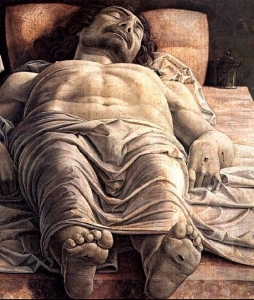9. Permanent Imputation vs Temporary Infusion
I have limited knowledge of how imputation differs across the various Protestant sects, especially when coupled or divorced from regeneration. So I want to avoid the mischaracterizations I’m responding to now. I do know that Catholicism rejects the God of band-aid solutions for the God whose word never returns to Him void. He is the God of Mercy not self deceit. This reality is expressed in Catholicism’s belief in both imputation and infusion. Catholicism does not reject imputation entirely, we reject the idea of mere imputation. We place our faith in the paradoxical God who is three and one; the savior who is God and Man, eternal and mortal; the Scriptures that are of human and divine origin, the Church that is human institution and mystical body. So yes, we accept the paradoxical view that we are righteous sinners, or as a friend put it, “I am a loved sinner, in that order.” White describes it well and the interpretive key is childhood – restoration to the covenant family:
In short, justification in the Catholic view is the gift of divine sonship, lost in original sin, and regained in Christ. Justification understood in this way involves both the imputation of sonship and the infusion of Christ’s grace. These two aspects are inseparable, for as God imputes family standing to the sinner, the sinner does in fact become a member of the family; sonship is no legal fiction. God effectuates what He declares. Hence, when God declares the sinner righteous, it is more than a mere legal declaration. It is a creative and transformative action whereby God takes someone and breathes into Him that Spirit of sonship which cries, “Abba!” “Father!” Gratuitous, therefore, means more than the receipt of divine favor. What God imparts in the gift of grace is Himself, nothing less, and this life-giving divine gift is a metaphysical, ontological communication of Christ’s sonship. This internal renovation is essential. For individuals are both imputed with Adam’s guilt and infused with his corrupt nature; they are declared sinful, and at the same time, they really are sinful. Hence, justified persons are both imputed with Christ’s righteousness and infused with His life; they are declared righteous because, in virtue of Christ’s indwelling life and holiness, they really are righteous. The remission of sins is possible because the grace of Christ is infused into the person, making him a child of God. By virtue of this new filial relationship, the individual is no longer subject to the wrath of God. God’s judgment then, is directed towards a child in the second Adam, and not a rebel criminal in the first Adam. This helps explain why justified persons need not be perfect themselves; they are justified by virtue of their new relationship to God as sons. The judgment is taking place then with regard to Christ’s grace alive in the individual, at whatever degree of growth; the indwelling grace of Christ justifies sinners. (White, Sola Gratia, Solo Christo, 4-5)
Now Challies emphasizes the ‘temporary’ for some reason. My guess is he believes the common Protestant stereotypes that Catholics live in a perpetual state of fear of Hell or that we think we have to earn God’s love. While Catholics, along with the witness of Scripture, take seriously that: some sins are deadly (1 John 5:16), without fruit we can be taken away (John 15:20), we can be removed after being grafted (Rom. 11:17-24), we can be disqualified after preaching (1 Cor. 9:24-27), we can twist the Scripture to our own destruction (2 Peter 3:16), we can be among the goats on His left (Matt. 25:41-46), or we can be told that we aren’t known (Matt. 7:21-23) we don’t see those as threats to consume us with fear. For though these are possible after enlightenment and the tasting of heavenly gifts, we are strongly encouraged and anchored by our God who cannot lie (cf. Heb. 6). See how Trent articulates that reality:
For God does not command impossibilities, …(St. Augustine, De Natura et Gratia, c. 43 (50)) His commandments are not heavy,(cf. 1 John 5:3) and his yoke is sweet and burden light.(Matt. 11:30) For they who are the sons of God love Christ, but they who love Him, keep His commandments, as He Himself testifies;(John 14:23) which, indeed, with the divine help they can do.… For God does not forsake those who have been once justified by His grace, unless He be first forsaken by them. Wherefore, no one ought to flatter himself with faith alone, thinking that by faith alone he is made an heir and will obtain the inheritance, even though he suffer not with Christ, that he may be also glorified with him.(Rom. 8:17) … the same Apostle admonishes those justified, saying: Know you not that they who run in the race, all run indeed, but one receiveth the prize? So run that you may obtain. I therefore so run, not as at an uncertainty; I so fight, not as one beating the air, but I chastise my body and bring it into subjection; lest perhaps when I have preached to others, I myself should become a castaway.(cf. 1 Cor. 9:24, 26) So also the prince of the Apostles, Peter: Labor the more, that by good works you may make sure your calling and election. For doing these things, you shall not sin at any time. (cf. 2 Pet. 1:10)
Following this last scripture passage cited by Trent, I believe it wise to present one of the most succinct scriptural articulations of Catholic Soteriology:
His divine power has bestowed on us everything that makes for life and devotion, through the knowledge of him who called us by his own glory and power: Through these, he has bestowed on us the precious and very great promises, so that through them you may come to share in the divine nature, after escaping from the corruption that is in the world because of evil desire. For this very reason, make every effort to supplement your faith with virtue, virtue with knowledge, knowledge with self-control, self-control with endurance, endurance with devotion, devotion with mutual affection, mutual affection with love. If these are yours and increase in abundance, they will keep you from being idle or unfruitful in the knowledge of our Lord Jesus Christ. Anyone who lacks them is blind and shortsighted, forgetful of the cleansing of his past sins. Therefore, brothers, be all the more eager to make your call and election firm, for, in doing so, you will never stumble. For, in this way, entry into the eternal kingdom of our Lord and savior Jesus Christ will be richly provided for you. (2 Peter 1:3-11)
If one wants to claim that Catholic Soteriology is unbiblical 2 Peter must be struck from the Bible first.
Wrap up: The principle problem with this Litany of ‘Additions’ is that they aren’t additions at all. Instead they are recognitions of how God chose to work. Catholicism is not guilty of piling junk upon the Gospel. Protestantism has instead cut away from the Gospel. It took the glorious Gospel of the transcendent I Am and reduced it to the courtroom proclamation of a self-deceiving, seemingly insecure God.
Justification, in the Catholic sense, is the restoration of that sonship through the second Adam, Jesus Christ; sinners are reborn through baptism as sons of God. In this process, justification is purely gratuitous. The Holy Spirit works in the sinner, effectuating in him an orientation towards faith and good works. Through baptism, he is imputed standing in God’s family and infused with Christ’s grace. Justification then, involves both the legal remission and the actual removal of sin. The forgiveness of sins is possible precisely because the justified person stands in a new relationship to God as a son. Because the grace of Christ is in him, original sin is blotted out, actual sins are remitted, and grace is continually imparted to overcome concupiscence. The justified person continually seeks to obtain “sanctifying grace” through the sacraments (which in the case of adults, are useless without real faith) and by doing good works. In this sense, individuals are justified by works as well as faith, but always by grace alone and Christ alone. Justification is a process, therefore, whereby higher standing is progressively conferred upon children growing up. (White, Sola Gratia, Solo Christo, 8).
What is the Catholic Gospel you ask?
Jesus Christ is the Gospel. He is the good news. He is the Messiah. The incarnate Word of God who has entered into solidarity with us so He may draw us into communion with Himself and, through Him, all those He loves.
His body is the Gospel. For by His body in the womb of Mary He bridged the divide between divinity and humanity. In His body that wandered around the Jordan He overcame our temptations of the flesh, the world, and the Devil. By the sacrifice of His body He ransomed us from exile, bringing us — as our goel (kinsman redeemer) — back into the family, paying for us a price we could not pay. As the true older brother who reflects the Father He restored an inheritance that we lost (cf. Luke 15:11-32). Through the resurrection of His body He overcame our otherwise insurmountable enemy – death — and transformed the dead end of mortality into the door to eternity. In His body, the Church, He guides us on our pilgrimage from Egypt to the Promised Land – the Heavenly Jerusalem. And by His body He nourishes us, sustains, and feeds us, providing our “food for the way” (cf. 1 Kings 19:7).
The heart of the Gospel is that the Word became flesh and tabernacled among us. And while we were still sinners He died for us, entering into death to defeat it. It is because he first had this love for us that we can love. Love has loved us and freed us to love. That is good news.
Next Post:
Claim 2: The “Roman” Catholic Church is not the Church

 As my eyes fell on the first lines of Isaiah I was reminded of Christ lying in the tomb, seemingly silent and still, but we would do well to not be fooled. His body might have been as silent as the grave and still as stone, but this is when we traditionally imagine Jesus invading the realm of the dead and causing it to burst at its seams. It cannot restrain the Author of Life and we see that on display tomorrow with the vindication of the resurrection.
As my eyes fell on the first lines of Isaiah I was reminded of Christ lying in the tomb, seemingly silent and still, but we would do well to not be fooled. His body might have been as silent as the grave and still as stone, but this is when we traditionally imagine Jesus invading the realm of the dead and causing it to burst at its seams. It cannot restrain the Author of Life and we see that on display tomorrow with the vindication of the resurrection. People who know me would agree that I am easy to sidetrack. Students and friends know that I am one derailed train of thought away from twenty minutes of tangential, and likely trivial, conversation. This tendency sheds light on my affinity for blazes. I don’t mean fires, I mean trail markers. I love that purple square painted on a tree or the cairn (small pile of rocks) that guides your hike through a barren region. It is these trail markers that keep you on track. They are a sign reminding us how we got here, where we are going, and why we are on this journey in the first place.
People who know me would agree that I am easy to sidetrack. Students and friends know that I am one derailed train of thought away from twenty minutes of tangential, and likely trivial, conversation. This tendency sheds light on my affinity for blazes. I don’t mean fires, I mean trail markers. I love that purple square painted on a tree or the cairn (small pile of rocks) that guides your hike through a barren region. It is these trail markers that keep you on track. They are a sign reminding us how we got here, where we are going, and why we are on this journey in the first place. This call back to purpose, back to the trail, happens in today’s Gospel. Jesus’ disciples were reveling in the authority and power that had been granted to them. Jesus celebrates with them for a moment, entertaining their tangent. Then with these words he called them back, “Nevertheless, do not rejoice because the spirits are subject to you, but rejoice because your names are written in heaven”. Great things were happening around them and through them. But without the right perspective those things would sidetrack them from the path. It could lead to childish competition, inflated egos, lust for spiritual power, or an easy to tempt desire for the next spiritual thrill. Jesus called them back from that, he reminded them where the trail was.
This call back to purpose, back to the trail, happens in today’s Gospel. Jesus’ disciples were reveling in the authority and power that had been granted to them. Jesus celebrates with them for a moment, entertaining their tangent. Then with these words he called them back, “Nevertheless, do not rejoice because the spirits are subject to you, but rejoice because your names are written in heaven”. Great things were happening around them and through them. But without the right perspective those things would sidetrack them from the path. It could lead to childish competition, inflated egos, lust for spiritual power, or an easy to tempt desire for the next spiritual thrill. Jesus called them back from that, he reminded them where the trail was.